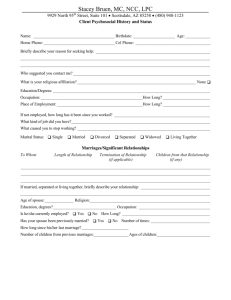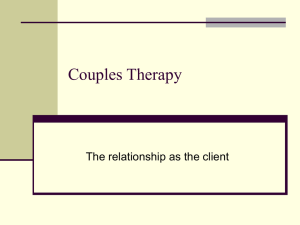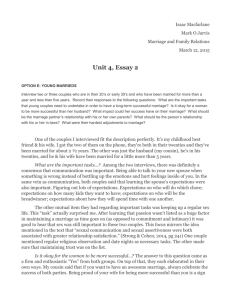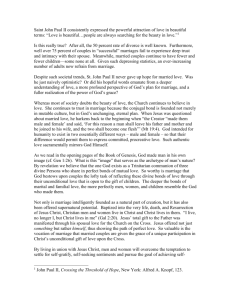to - Wedding Ireland Online
advertisement
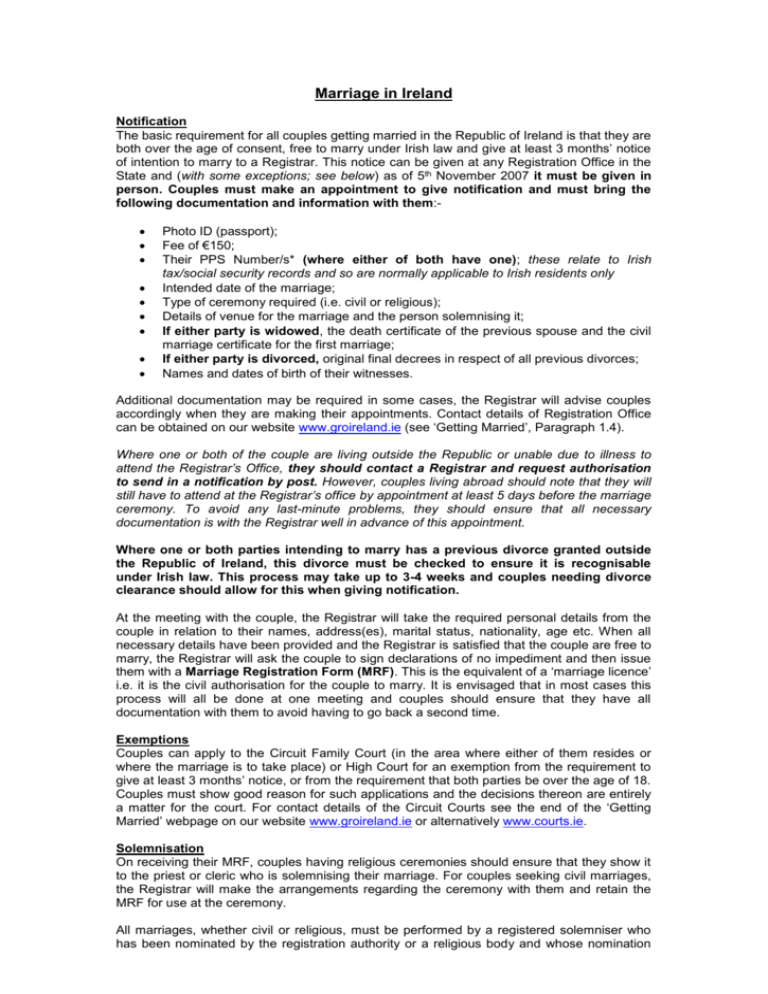
Marriage in Ireland Notification The basic requirement for all couples getting married in the Republic of Ireland is that they are both over the age of consent, free to marry under Irish law and give at least 3 months’ notice of intention to marry to a Registrar. This notice can be given at any Registration Office in the State and (with some exceptions; see below) as of 5th November 2007 it must be given in person. Couples must make an appointment to give notification and must bring the following documentation and information with them: Photo ID (passport); Fee of €150; Their PPS Number/s* (where either of both have one); these relate to Irish tax/social security records and so are normally applicable to Irish residents only Intended date of the marriage; Type of ceremony required (i.e. civil or religious); Details of venue for the marriage and the person solemnising it; If either party is widowed, the death certificate of the previous spouse and the civil marriage certificate for the first marriage; If either party is divorced, original final decrees in respect of all previous divorces; Names and dates of birth of their witnesses. Additional documentation may be required in some cases, the Registrar will advise couples accordingly when they are making their appointments. Contact details of Registration Office can be obtained on our website www.groireland.ie (see ‘Getting Married’, Paragraph 1.4). Where one or both of the couple are living outside the Republic or unable due to illness to attend the Registrar’s Office, they should contact a Registrar and request authorisation to send in a notification by post. However, couples living abroad should note that they will still have to attend at the Registrar’s office by appointment at least 5 days before the marriage ceremony. To avoid any last-minute problems, they should ensure that all necessary documentation is with the Registrar well in advance of this appointment. Where one or both parties intending to marry has a previous divorce granted outside the Republic of Ireland, this divorce must be checked to ensure it is recognisable under Irish law. This process may take up to 3-4 weeks and couples needing divorce clearance should allow for this when giving notification. At the meeting with the couple, the Registrar will take the required personal details from the couple in relation to their names, address(es), marital status, nationality, age etc. When all necessary details have been provided and the Registrar is satisfied that the couple are free to marry, the Registrar will ask the couple to sign declarations of no impediment and then issue them with a Marriage Registration Form (MRF). This is the equivalent of a ‘marriage licence’ i.e. it is the civil authorisation for the couple to marry. It is envisaged that in most cases this process will all be done at one meeting and couples should ensure that they have all documentation with them to avoid having to go back a second time. Exemptions Couples can apply to the Circuit Family Court (in the area where either of them resides or where the marriage is to take place) or High Court for an exemption from the requirement to give at least 3 months’ notice, or from the requirement that both parties be over the age of 18. Couples must show good reason for such applications and the decisions thereon are entirely a matter for the court. For contact details of the Circuit Courts see the end of the ‘Getting Married’ webpage on our website www.groireland.ie or alternatively www.courts.ie. Solemnisation On receiving their MRF, couples having religious ceremonies should ensure that they show it to the priest or cleric who is solemnising their marriage. For couples seeking civil marriages, the Registrar will make the arrangements regarding the ceremony with them and retain the MRF for use at the ceremony. All marriages, whether civil or religious, must be performed by a registered solemniser who has been nominated by the registration authority or a religious body and whose nomination has been approved. The Register of Solemnisers may be inspected on the General Register Office website (www.groireland.ie ‘Getting Married’ section, Paragraph 2.2) or by contacting the Marriages Unit of the GRO at Government Offices, Convent Road, Roscommon, phone 090-6632945/7/8/9, 6632964 or 6632970. At the end of the ceremony, the couple, the witnesses and the solemniser must sign the MRF and it should then be returned to the Registrar by the couple within 1 month of the ceremony, so that the marriage can be civilly registered. In civil marriages, the Registrar will simply retain the MRF for registration purposes. Venues The venues for religious marriages are a matter to be determined between the couples and the solemnisers and churches involved; the venue must be open to the public. A civil marriage may take place either in a registry office or at a venue which has been agreed between the couple and the solemnising Registrar and which has been inspected and approved in advance of the ceremony by the registration authority, the Health Service Executive. Couples who wish to have their ceremony at a venue other than a registry office should contact a Registrar in the county where their marriage will take place, to make arrangements to have the proposed venue inspected. Approvals are granted for each individual ceremony but where a venue has been recently approved for another ceremony, it will not normally be necessary for another inspection to be carried out. Couples should note that only fixed structures with public access can be approved as venues for the solemnisation of civil marriages. Open-air venues and temporary structures such as marquees cannot be considered. For full details of the requirements for the approval of venues see our website www.groireland.ie at the ‘Getting Married’ section, Paragraph 2.1. All marriage venues (whether religious or civil) are required by law to be open to the public. Buildings such as churches, registry offices and hotels meet this requirement; others such as private houses do not. If you have any further enquiries, please consult our website www.groireland.ie (‘Getting Married’ section) or contact a Registration Office or the Marriages Unit of the General Register Office at 090-6632945/6/7/8/9 or 6632964/70/62. Civil Partnership and same-sex couples Introduction A statutory Civil Partnership registration scheme for same-sex couples has been introduced under the Civil Partnership and Certain Rights and Obligations of Cohabitants Act 2010. The Act also sets out the rights and obligations that such couples have towards each other. These are broadly the same as the rights and obligations of married couples towards each. The Act came into effect on 1st January 2011. Necessary changes to the tax and social welfare codes are also being made. Registration of Civil Partnerships Under the Act same-sex couples can register their relationship as a Civil Partnership. The Registrar-General is obliged to maintain a register of Civil Partnerships, a register of decrees of dissolution of Civil Partnerships and a register of nullity of Civil Partnerships. The registration rules and processes are broadly similar to those for the registration of a civil marriage, annulments of marriage and divorce. Civil Partnerships may simply be registered. There is no necessity to have a Civil Partnership ceremony, unlike marriages which require a marriage ceremony. Civil partners may choose to have a ceremony and, if they do, the requirements are similar to those that apply to marriage ceremonies. The courts have the power to declare a Civil Partnership to be valid or invalid. The courts already had such a power in relation to marriage. An application for a declaration on the validity of a Civil Partnership could arise, for example, if one of the couple had been in a previous Civil Partnership or had been married and there was doubt about whether or not that Civil Partnership or marriage had been legally ended. The Act provides that the Minister for Justice and Law Reform may make orders recognising classes of legal relationships which are registered as Civil Partnerships in other countries and which meet certain criteria. There are various reasons why you may not be allowed to marry – legally, these are known as impediments. The main ones are age, consanguinity (close blood relationship) and an existing valid marriage. An existing valid Civil Partnership is also an impediment to marriage. Similar impediments also apply to Civil Partnerships. If a civil partner dies, the main responsibility for registering the death rests with the surviving partner. Formalities for registration The formalities are broadly similar to the formalities for marriage. Among other things, this means that you must give three months’ notice of your intention to enter into a Civil Partnership. There is provision for an exemption from this requirement – you may apply to the Circuit Court or the High Court for such an exemption. You must be free to enter into a Civil Partnership, that is, there must be no impediments to your doing so. A Civil Partnership ceremony must be held at an approved venue. Civil Partnerships may be registered only by civil registrars; marriages may be registered by registered religious solemnisers. The rules about who may enter a Civil Partnership are similar to the rules about who may marry. In general, that means you must be aged 18 or over, not be already married or in an existing valid Civil Partnership, not be closely related and be capable of consenting to entering the relationship. Further information on Civil Partnership registration is available on the General Registrar's website. Ending a Civil Partnership The courts are able to grant a decree of nullity of Civil Partnership in broadly the same way as decrees of nullity of marriage are granted. The courts are also able to dissolve Civil Partnerships in a similar way to the granting of divorce. However, the rules governing the dissolution of Civil Partnerships are different. A dissolution may be granted if the civil partners have lived apart for a total period of 2 years during the previous 3 years and proper provision has been made for each of them (divorce may be granted if a married couple have lived apart for a total of 4 years out of the previous 5 years). Orders such as protection orders, maintenance orders and pension adjustment orders may be made in the course of court proceedings for the dissolution of Civil Partnerships in the same way as such orders may be made in judicial separation and divorce proceedings. Property adjustment orders may also be made during or after the proceedings but they may not be made in favour of a former civil partner who has registered in a new Civil Partnership or has married. A property adjustment order may not be made over a shared home in which one of the former civil partners’ lives with a new civil partner or a family home in which one of the former civil partners lives with a spouse. Unlike divorce proceedings, the civil partners’ legal advisers are not required to discuss the possibility of reconciliation, mediation or other alternatives to dissolution. The court may, however, adjourn proceedings in order to facilitate such alternatives. Consequences of a Civil Partnership The legal consequences of entering into a Civil Partnership are broadly similar to the legal consequences of getting married but there are some differences. In general, married couples may not opt out of their obligations towards each other in respect of, for example, maintenance; this is also the case with civil partners. Former spouses who enter Civil Partnerships Former spouses who enter into Civil Partnerships effectively lose their status as former spouses. Under the divorce legislation former spouses continue to have the right to apply to the courts for maintenance and property orders. However, once they enter into a Civil Partnership, this changes. Maintenance orders and pension adjustment orders in favour of a former spouse lapse if that spouse enters into a Civil Partnership. A property adjustment order may not be made for the benefit of a former spouse if that spouse has registered in a Civil Partnership. Shared home protection Under the Family Home Protection Act 1976, a spouse’s consent is required for the selling or mortgaging of the family home. The Act also provides that a spouse may apply to the court for an order to enforce his or her right to remain in occupation, to exclude the other spouse or to regulate the occupation of either or both of them. The new Act provides that broadly similar provisions apply to the shared home of a couple in a Civil Partnership. There are also similar provisions for the courts to dispense with the other partner’s consent where it considers that the withholding of consent is unreasonable. A civil partner is also able to apply to the courts for orders restraining a partner from doing anything that might reduce his or her interest in the shared home or make it unsuitable to live in. If repossession proceedings are taken against one partner because of mortgage arrears, the court may decide to give the other partner the opportunity to take over the mortgage repayments. A civil partner may inform the Property Registration Authority that he or she is the civil partner of a property owner. A notice to that effect will then be registered. There is no charge for such a registration. There is no requirement to enter such a registration and its absence does not affect the rights of a civil partner. The provisions of the Residential Tenancies Act 2004 in relation to spouses also apply to civil partners. Among other things, that means that a civil partner may be able to take over a tenancy on the death of the other partner. Maintenance Civil partners are able to claim maintenance from the other partner in broadly the same way as spouses can. Some of the factors to be taken into account when a court is deciding whether or not to make a maintenance are: The income and assets of each partner Their responsibilities to each other, to any dependent children of either and to any former spouse or former civil partner The conduct of each of them if it would be unjust not to take that into account Attachment of earnings orders are also available for the enforcement of maintenance orders. The general arrangements for enforcement are the same as for enforcement of maintenance orders by spouses. Written agreements about maintenance made by civil partners may be made into enforceable court orders in the same way as similar agreements between spouses. Succession The Act provides that civil partners have the same legal right to inherit as spouses and the same rights on intestacy. A will is automatically revoked when you marry unless it was made in contemplation of marriage. Similarly, a will is revoked when you register a Civil Partnership unless it was made in contemplation of that registration. A bequest in a will to a person who is a witness to the will or to that person’s spouse is void. This also applies to the civil partners of witnesses. Children have no automatic right to inherit from their parents but they may apply to court if they consider that proper provision has not been made for them. The court may order that some provision be made for a child or children from the estate of the deceased. Such an order cannot reduce the entitlement of a spouse to a legal right share, but it can reduce the entitlement of a civil partner. Domestic violence The arrangements for safety orders and barring orders also apply to civil partners in the same way as to spouses. Equality Discrimination on the grounds of sexual orientation is already prohibited. The Act amends the equality legislation to provide for the prohibition of discrimination on the grounds of “civil status”. This replaces “marital status” as a ground of discrimination and includes both marital status and Civil Partnership status. The effect is that you may not be discriminated against on the ground that you are or were in a registered Civil Partnership. Other consequences of Civil Partnership Various pieces of legislation which deal with requirements to declare interests or with conflicts of interest, for example, the Ethics in Public Office Act 1995, provide that connected people or connected relatives are also subject to the same requirements. The Act provides that civil partners are to be treated as connected people in the same way as spouses. Civil liability A civil partner has been added to the list of dependants in respect of whom a person may sue for damages for wrongful death. Pensions A pension scheme that provides a benefit for a spouse is deemed to provide a benefit for a civil partner. Mental health Civil partners have the same role in relation to involuntary admission to psychiatric hospitals as spouses have. Power of attorney A civil partner must be informed of the registration of an enduring power of attorney in the same way as a spouse. Similarly, an enduring power of attorney in favour of a civil partner ceases to be valid if the partnership is dissolved or there is a safety or barring order against the civil partner. Property disputes A civil partner may apply to the courts for a decision in relation to disputes over property with his/her partner. Children The Act does not change the law on issues relating to children, for example, guardianship, adoption, custody, access or maintenance. Tax and social welfare The Act does not deal with tax and social welfare. However, it is the intention that people in Civil Partnerships are treated in the same way as married couples. This has required changes to the social welfare and finance legislation. Immigration The Act does not provide for any changes to the immigration legislation but it is intended to amend immigration legislation to ensure that registered civil partners or equivalent relationships are treated in the same way as spouses. www.citizensinformation.ie
